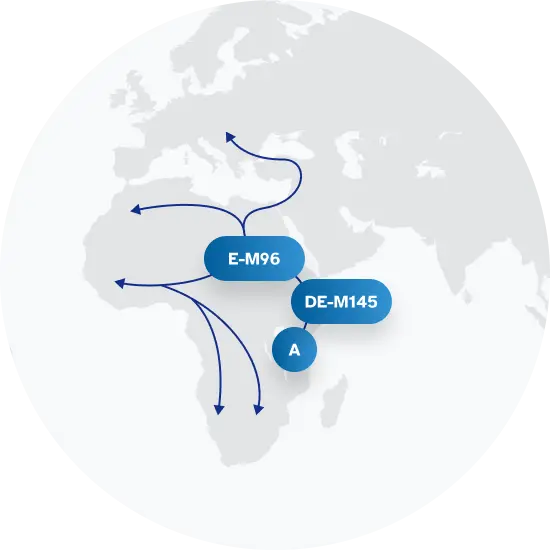Explore the Family Name Schlesinger
The meaning of Schlesinger
German and Jewish (Ashkenazic): habitational name for someone from Silesia, German Schlesien, Schlesing ‘Silesia’ (Polish Śląsk). The area was named for the Silingae, an ancient Germanic people who occupied the region before being displaced by Slavs in the 8th century ad. It has been governed at different times by Prussia and by Poland. Since 1945 it has been part of Poland. Other places called with the same element include Schleusingen in Saxony, Schlenzig in Pomerania, and Schlenz in Silesia itself, and it is possible that in some instances the surname derives from one of these. Some characteristic forenames: Jewish Moshe, Avram, Chaim, Tovia, Aron, Avi, Baruch, Chana, Cohen, Eran, Gitty. German Hans, Otto, Heinz, Kurt, Bernd, Erna, Erwin, Eugen, Gerhard, Hilde, Ingeborg, Manfred.
Dictionary of American Family Names, 2nd edition, © Oxford University Press, 2022.
How common is the last name Schlesinger in the United States?
The Schlesinger surname has experienced minor fluctuations in its popularity based on data from the Decennial U.S. Census. In 2000, it held a rank of 8011 and rose slightly to 8398 by the 2010 census - a change of -4.83. The total count of individuals with this surname increased by 3.2% from 3818 to 3940 during the same period. However, the proportion of individuals per 100k with the Schlesinger surname decreased slightly by -5.63%, suggesting that while the absolute number of people with the name increased, their share among the total population declined.
| 2000 | 2010 | Change | |
|---|---|---|---|
| Rank | #8,011 | #8,398 | -4.83% |
| Count | 3,818 | 3,940 | 3.2% |
| Proportion per 100k | 1.42 | 1.34 | -5.63% |
Race and Ethnicity of people with the last name Schlesinger
As for ethnic identity, the Schlesinger surname is predominantly associated with those identifying as White, making up 95.10% in 2000 and slightly decreasing to 93.98% in 2010, according to the Decennial U.S. Census data. There was an increase in the percentage of those identifying as Hispanic, going from 1.68% in 2000 to 2.61% in 2010, a growth rate of 55.36%. Individuals identifying as Asian/Pacific Islander and American Indian and Alaskan Native started appearing in the 2010 census, with proportions of 0.69% and 0.15%, respectively. Those identifying as Black or having two or more races also make up a small percentage of the Schlesinger surname holders, with slight changes over the decade.
| 2000 | 2010 | Change | |
|---|---|---|---|
| White | 95.1% | 93.98% | -1.18% |
| Hispanic | 1.68% | 2.61% | 55.36% |
| Two or More Races | 1.13% | 1.42% | 25.66% |
| Black | 1.39% | 1.14% | -17.99% |
| Asian/Pacific Islander | 0% | 0.69% | 0% |
| American Indian and Alaskan Native | 0% | 0.15% | 0% |
Schlesinger ancestry composition
23andMe computes an ancestry breakdown for each customer. People may have ancestry from just one population or they may have ancestry from several populations. The most commonly-observed ancestry found in people with the surname Schlesinger is Ashkenazi Jewish, which comprises 45.2% of all ancestry found in people with the surname. The next two most common ancestries are British & Irish (22.1%) and French & German (14.2%). Additional ancestries include Eastern European, Italian, Scandinavian, Spanish & Portuguese, and Chinese.
Ready to learn more about your ancestry? Get the most comprehensive ancestry breakdown on the market by taking our DNA test. Shop 23andMe
| ANCESTRY BREAKDOWN | COMPOSITION |
|---|---|
| Ashkenazi Jewish | 45.2% |
| British & Irish | 22.1% |
| French & German | 14.2% |
| Other | 18.5% |

Possible origins of the surname Schlesinger
Your DNA provides clues about where your recent ancestors may have lived. Having many distant relatives in the same location suggests that you may all share common ancestry there. Locations with many distant relatives can also be places where people have migrated recently, such as large cities. If a large number of individuals who share your surname have distant relatives in a specific area, it could indicate a connection between your surname and that location, stemming from either recent ancestral ties or migration.
Based on 23andMe data, people with last name Schlesinger have recent ancestry locations in the United Kingdom of Great Britain and Northern Ireland and Ireland.
| RECENT ANCESTRY Location | Percentage |
|---|---|
| Greater Manchester, United Kingdom | 53.70% |
| Greater London, United Kingdom | 53.70% |
| Merseyside, United Kingdom | 53.70% |
| Lancashire, United Kingdom | 52.90% |
| West Midlands, United Kingdom | 52.90% |
What Schlesinger haplogroups can tell you
Haplogroups are genetic population groups that share a common ancestor on either your paternal or maternal line. These paternal and maternal haplogroups shed light on your genetic ancestry and help tell the story of your family.
The top paternal haplogroup of people with the surname Schlesinger is E-M34, which is predominantly found among people with European ancestry. Haplogroup E-M34 is descended from haplogroup E-M96. Other common haplogroups include I-L460 and J-M410, which are predominantly found among people with European and European ancestry. Other surnames with similar common haplogroups are: Mandel, Moskowitz, Weinberg, Rothman, Hyman, Lazarus, Perlman, Rosenbaum, Wexler, Weil.
The most common maternal haplogroups of people with Schlesinger surname are: H1, N, H. These most commonly trace back to individuals of European ancestry.
 Paternal Haplogroup Origins E-M96
Paternal Haplogroup Origins E-M96
Your paternal lineage may be linked to Napolean Bonaparte
The French Emperor Napoleon Bonaparte descended from the common ancestor of haplogroup E-M34. The male line of the Bonaparte family was from Tuscany, where Napoleon's earliest known male ancestors lived for at least six generations. Eleven generations before Napoleon, his ancestor, Giovanni, was the first to leave Tuscany for Corsica. The Bonaparte lineage lived in Corsica for ten generations before Napoleon's father, Charles-Marie Bonaparte. Charles-Marie (born in 1746) married Napoleon's mother, Letizia Ramolino, at the age of 18 in 1764.
Your maternal lineage may be linked to Marie Antoinette
Because it is so dominant in the general European population, haplogroup H also appears quite frequently in the continent's royal houses. Marie Antoinette, an Austrian Hapsburg who married into the French royal family, inherited the haplogroup from her maternal ancestors. So did Prince Philip, Duke of Edinburgh, whose recorded genealogy traces his female line to Bavaria. Scientists also discovered that famed 16th century astronomer Nicolaus Copernicus traced his maternal lineages to haplogroup H.

What do people with the surname Schlesinger have in common?
Spoiler alert: it's complicated. People with the same last name are usually no more genetically similar than a randomly sampled group of people from the same population. That said, people with the same surname are more likely to have similar ancestries than randomly sampled individuals. The reason is the tendency of people with similar cultural or geographical backgrounds to preferentially mate with one another. That's why people who share a surname may be more likely to share traits and tendencies in common than people within the general population. Check out the percentages below to see the prevalences of tastes, habits, and traits of people with your surname compared with prevalences among 23andMe users.
Preferences
Traits
Habits
Wellness
Are health conditions linked to the last name Schlesinger?
The short answer is that, if there is an association between surname and health, it's usually more about your ancestry than your name. Individuals with a given surname are no more genetically similar than the general population but often have similar ancestries. The populations of people associated with those shared ancestries often have sets of genetic variations, also known as alleles, in common. Some of those alleles are associated with a greater likelihood of developing certain diseases.
Disease variant frequency by ancestry
Disease allele frequencies in populations associated with the surname Schlesinger are shown below. Important Note: not everyone with a disease allele will develop these health condition





















